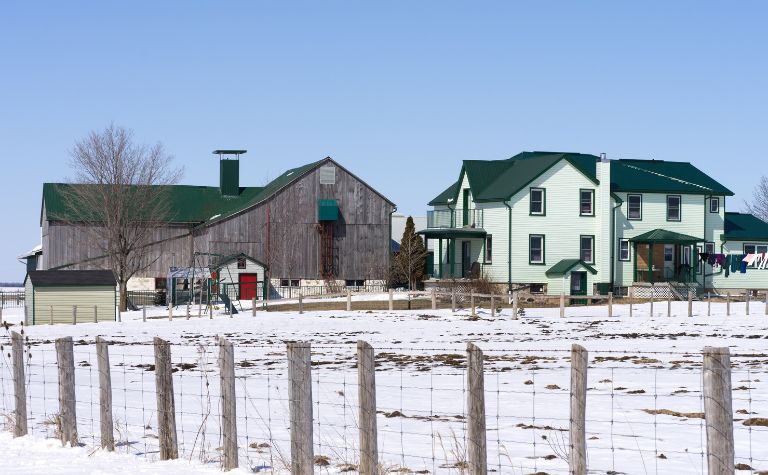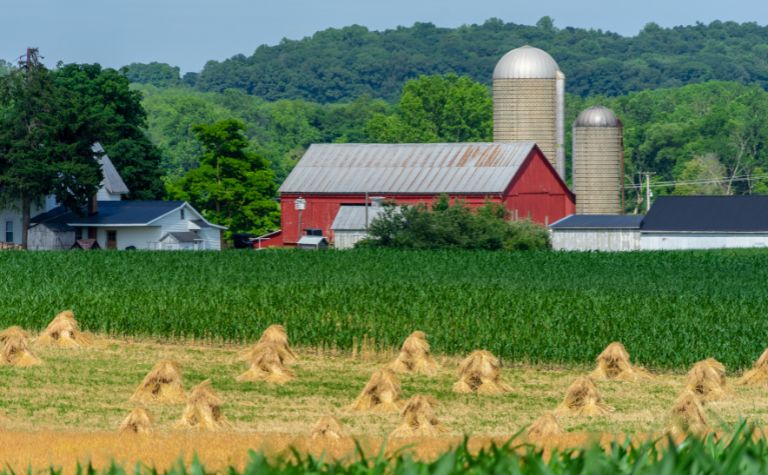Mennonites are a protestant sect that originated from the same revolutionary church reform movement of the 16th century that led to the creation of the Anabaptist congregation. Followers of Menno Simons, their core beliefs align with pacifism and the staunch rejection of violence.
Mennonites say “once” as an expression of politeness. The phrase is common to Mennonite and Amish practice, and its intended meaning depends upon the context. Some people use it as a replacement for the word “please.” In other instances, it insinuates the present period.
The rest of this article shall explain the reasons behind the use of the word ‘once’ by Mennonites. Other phrases that Mennonites use and commonalities between their language and Pennsylvania Dutch will also be discussed.
Also see Do Mennonites Vote? to learn more.

How Do Mennonites Use the Word Once?
The Mennonite language represents a religious belief in showing gratitude for the gift of life. Like other Mennonite practices, it also advocates living a life of love, peace, and tranquility by challenging worldly injustices through good actions.
The foundations of this faith are regarded as voluntary, and, within the Mennonite practice, material life is neglected in pursuance of happiness, and morals are favored over politics.
Mennonites use the word “once,” pronounced as “wonst,” to mean “soon or forthcoming,” “please,” “immediately,” or “forgiveness,” depending on the context of its usage. These connotations reflect their history and religious heritage and are integral to their linguistic culture.
The word “once” may be expressed in a sentence in several ways. For example, one can say, “Pass me the bottle once” to substitute the word “once” for “please.”
However, this does not mean that Mennonites do not use the word ‘please.’ Instead, once substitutes for a one-time action that will be quick and not require compensation, it is used when in need of a small favor. [1]
Also see How To Tell If A Mennonite Woman Is Married to learn more.

What Other Unique Words or Phrases Do Mennonites Say?
The Mennonite culture is recognized for its religious practices, peaceful views, and unique speech mannerisms. While the group primarily uses the English language, how they use it makes them culturally distinct.
Other unique words used by the Mennonites include “yet,” “awhile,” “all,” and “rutsch.” Mennonites largely focus on throw-in words that have a different context and meaning in comparison to the literal meaning of the word. It’s also possible for some of these words to have no meaning at all.
These phrases can confuse an individual who’s unaware of their applied context. For example, in the case of Mennonites using the word “once,” several of these words can have different meanings depending on their context.
1. Yet
The word “yet” is distinct in its usage as it is meaningless terminology. People may use it as a replacement for ‘once.’ However, people also use ‘yet’ frequently as a stylistic verbal appendage in Amish and Mennonite vocabulary.
Sometimes, the word “yet” can be used as a replacement for ‘as well’ or ‘also.’ However, this is an uncommon practice. For instance, a Mennonite might say, “Hand me that bottle yet,” to ask for a bottle “as well.”
2. Awhile
The meaning of awhile is ‘in the meantime.’ Intended to relieve the speaker’s burden, it showcases the typical Mennonite politeness. This usage of awhile implies that the speaker does not want to prevent another from stopping whatever they are doing.
For instance, a Mennonite might say, “I need to make a call, awhile, you should continue your lunch.”
3. All
People use this word as a contraction for “all gone” or “finished.” It is one of the more uncomplicated of their verbal axioms. An example of its use would be if someone said, “Apologies, this was the last batch of the cookies. It’s all.”
4. Rutsch
The word rutsch has been incorporated into the modern-day English language as it does not have an equivalent. People use it when an individual re-situates themselves while sitting or lying down.
For instance, a speaker might say, “The man right behind me kept rutsching around throughout the movie.”
Also see Why Do Mennonites Wear Bonnets? to learn more.
Do Mennonites Speak Pennsylvania Dutch Like the Amish?
Pennsylvania Dutch (also known as Pennsylvania German) emerged during the 18th century in Pennsylvania’s south-eastern and central rural areas. The dialect hints at the German roots of early settlers. However, only 15% to 20% of its vocabulary is derived from the English language.
Most Old Order Mennonites speak Pennsylvania Dutch like the Amish. However, the increased mobility of local populations in recent years has caused the language to decline in popularity. These days only the most traditional families emphasize its transmission to their children.
Historians trace the origins of Pennsylvania Dutch to the migration of 81,000 Germans to Pennsylvania in the eighteenth century. At the time, most settlers of multiple Swiss and German social classes spoke in varying dialects. The intermingling of these dialects produced the language that became Pennsylvania Dutch.
The language has persisted to this day owing to its cultural significance in the Mennonite and Amish churches. It has also been sustained through its use by close-knit rural communities.
Today, many users of Pennsylvania Dutch continue to live outside city and town lines and receive very little formal education. Instead, like their forefathers, they live off of manual labor, selling handmade crafts, livestock farming, or agriculture.
In recent years, industrialization, urban development, and increased mobility and connectivity have increased the importance and usage of the English language in the region. Inevitably, this has diminished the use of Pennsylvania Dutch. [2]
While Amish people are more orthodox in their adherence to language codes, Mennonites have been more open to adopting English as a mode of communication.
Today, some Mennonites continue to maintain their traditional religious practices that promote the use of this distinct dialect. Although, members who perform mission work need to acquire the ability to understand and speak English.
Conclusion
Mennonites have adapted to the modern world as they have incorporated the use of technology and the English language into their lives.
Also see Do Amish and Mennonites Get Along? to learn more.
References:
[1] Source
[2] Source
Related Questions
The Amish and the Mennonite communities are two Christian sects that seem similar in the eyes of the "English" (those outside the faith). While there are fundamental similarities between the...
The Amish and Mennonite traditions fascinate many people. Each group's convictions about their Christian beliefs, community values, and the extent to which they should interact with society are...
